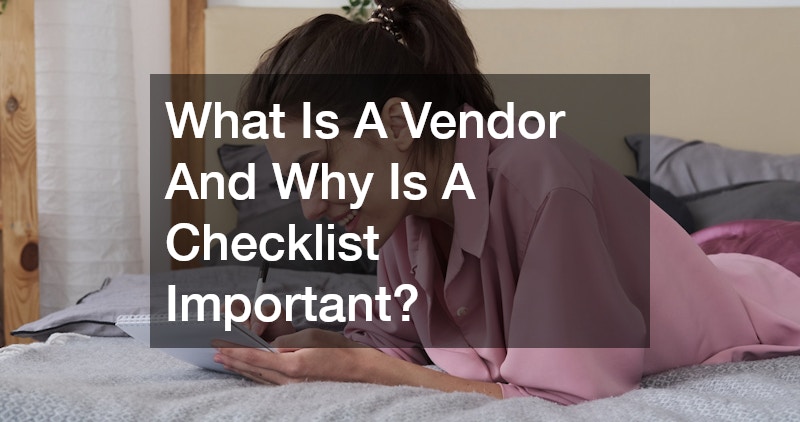
Organizing an event requires careful planning and attention to detail. Whether it’s a wedding, corporate gathering, festival, or trade show, preparation is essential to ensure a smooth and successful day. From selecting event venues to coordinating catering companies and arranging local DJ service, every element plays a role in the overall experience. This article provides a comprehensive event checklist, helping planners anticipate needs, streamline logistics, and ensure no detail is overlooked.
What Is A Vendor And Why Is A Checklist Important?

Understanding Vendors
Vendors are the service providers who help bring your event to life. These include local tent rentals, sign companies, local limousine companies, and airport car services. Each vendor offers specialized expertise, equipment, or services that enhance the event, and understanding their roles helps ensure nothing is missed during planning.
The Role Of Vendors In An Event
Vendors are integral to delivering a seamless experience. Catering companies handle food and beverage service, restroom rental companies ensure guest comfort with sufficient porta pottys, and local DJ service provides entertainment. Effective collaboration with these vendors ensures a cohesive, organized event from setup to teardown.
Key Benefits Of Using A Checklist
A checklist acts as a roadmap for event planning. It ensures all vendors are booked, delivery times are coordinated, and contingencies are in place. For example, a checklist can help confirm that local tent rentals arrive before the event starts or that sign companies deliver signs on schedule. By tracking each item, organizers can reduce stress and avoid last-minute emergencies.
Common Mistakes Without A Checklist
Failing to use a checklist can result in overlooked details, late deliveries, or insufficient services. Missing confirmations with local DJ service or forgetting to reserve restroom rental units can significantly impact guest experience. A checklist provides a safeguard against these common pitfalls, keeping planning organized and reliable.
How Checklists Improve Event Workflow
Checklists break down tasks into actionable steps, allowing organizers to assign responsibilities and monitor progress. Coordinating local limousine companies, ensuring airport car services run on schedule, and confirming catering companies are prepared all become easier with a structured workflow. Checklists keep communication clear, deadlines visible, and vendors accountable.
How Do I Find The Right Vendors For My Event?
Researching Potential Vendors
Research is essential to finding trustworthy vendors. Look for reliable local DJ service providers, reputable catering companies, and experienced sign companies. Recommendations from past clients, online reviews, and social media portfolios provide insight into vendor quality and reliability.
Factors To Consider When Choosing Vendors
Consider experience, availability, flexibility, and cost when evaluating vendors. Local tent rentals should offer durable, weather-resistant options. Airport car services need a proven record of punctuality, while local limousine companies must provide professional drivers and reliable vehicles. Each factor contributes to a smooth guest experience.
Questions To Ask Potential Vendors
Ask vendors about their experience, setup and teardown requirements, and emergency procedures. For catering companies, inquire about menu options, dietary accommodations, and delivery schedules. Sign companies should clarify production times, installation requirements, and customization options. Clear questions help avoid misunderstandings later.
Reading And Interpreting Vendor Reviews
Reviews can reveal patterns in service quality. Consistent praise for local DJ service responsiveness or restroom rental cleanliness is more meaningful than isolated comments. Pay attention to recurring complaints, as they often indicate potential issues you’ll want to avoid.
Creating A Shortlist Of Vendors
After research, narrow your choices to a shortlist of vendors. Include essential services like event venues, catering companies, and porta pottys, as well as optional vendors such as local tent rentals and sign companies for added ambiance. A focused shortlist streamlines contract negotiations and ensures vendors meet your specific needs.
What Should Be Included In A Vendor Contract?

Essential Contract Components
Contracts should clearly outline services provided, timelines, and responsibilities. Catering companies should specify menu details and service hours, while local DJ service agreements may cover playlist requirements and equipment needs. Contracts protect both the planner and the vendor, reducing the risk of misunderstandings.
Understanding Terms And Conditions
Vendors may have specific terms regarding cancellations, changes, or liability. Make sure agreements with local limousine companies or airport car services clarify pickup schedules and insurance coverage. Reading and understanding these details ensures compliance and avoids conflicts.
Negotiating Vendor Contracts
Negotiation can secure better rates or additional services. For example, combining local tent rentals and restroom rental services from a single provider may offer discounts. Be respectful but assertive when discussing pricing, service hours, or delivery schedules.
Contingencies And Cancellations
Contracts should include contingency plans for unforeseen events. For instance, if weather affects local tent rentals, the vendor should provide alternate solutions. Similarly, airport car services and local limousine companies should have backup vehicles in case of emergencies.
How Can I Effectively Communicate With Vendors?
Setting Clear Expectations
From the start, set clear expectations regarding arrival times, setup requirements, and service quality. Inform catering companies of dietary needs, communicate preferred signs placement with sign companies, and confirm music requirements with local DJ service. Clear communication reduces mistakes and last-minute surprises.
Maintaining Open Lines Of Communication
Regular communication ensures vendors stay aligned with your timeline. Use email, phone, or dedicated event management tools to track updates from local tent rentals, restroom rental providers, and airport car services. Consistent check-ins prevent miscommunication and help vendors anticipate your needs.
Resolving Conflicts With Vendors
If conflicts arise, address them promptly and professionally. Whether a local DJ service arrives late or catering companies face delivery delays, immediate resolution ensures the event stays on track. Clear agreements and open dialogue reduce stress during these situations.
Coordination Of Vendor Meeting Schedules
Scheduling regular meetings with vendors keeps everyone informed. Pre-event walkthroughs with event venues, setup plans with local tent rentals, and test runs with local DJ service ensure smooth operations on the day of the event. Coordination avoids timing conflicts and overlaps.
Follow-Up And Feedback
After the event, provide feedback to vendors. Positive reviews for catering companies, sign companies, or local limousine companies help maintain relationships for future events. Constructive feedback supports vendor improvement and strengthens partnerships.
What Logistics Should I Consider For The Event Day?

On-Site Setup Requirements
Determine what setup each vendor needs. Local tent rentals may require multiple hours for assembly, while sign companies need placement time. Ensure restroom rental units are accessible and local DJ service equipment is tested before guest arrival.
Coordinating Deliveries And Arrivals
Stagger deliveries to avoid congestion. Schedule catering companies, local limousine companies, and airport car services arrivals to allow for smooth flow. Proper timing ensures that the venue remains organized and vendors can operate without interference.
Planning For Technical Needs
Technical requirements must be confirmed. Local DJ service needs power sources, lighting, and sound checks, while sign companies may require electrical hookups for illuminated signs. Addressing technical needs in advance prevents delays and equipment issues.
Crowd And Traffic Management
Plan guest flow for entrances, exits, and parking. Local limousine companies and airport car services should have designated drop-off areas, while restroom rental placements avoid congestion. Proper crowd management enhances safety and overall experience.
Event Breakdown And Cleanup
Outline teardown procedures for each vendor. Local tent rentals require careful disassembly, sign companies may need to remove decorations, and catering companies should manage leftover food disposal. Coordinating cleanup ensures the venue is left in good condition and vendors complete responsibilities efficiently.
How Do I Prepare For Unexpected Situations?
Identifying Potential Risks
Recognize possible risks such as bad weather, late deliveries, or equipment failures. Local tent rentals might be affected by wind, airport car services could face traffic delays, and restroom rental units could experience malfunctions. Early identification allows for proactive solutions.
Creating A Contingency Plan
Develop plans to address potential issues. For instance, have extra porta pottys on standby, schedule backup local DJ service personnel, or coordinate with local limousine companies for alternate routes. Contingency plans reduce stress when challenges arise.
Emergency Contact Information
Maintain a comprehensive contact list. Include all vendors, from catering companies to sign companies, as well as venue staff and emergency services. Quick access to contacts ensures rapid problem resolution.
Quick Decision-Making Techniques
Assign decision-makers who can act swiftly during unexpected situations. This is critical for local tent rentals during sudden weather changes or airport car services delays. Empowering a team to make quick decisions keeps the event on schedule.
Insurance And Liability Considerations
Ensure all vendors have appropriate insurance coverage. Local limousine companies, local DJ service, and restroom rental providers should confirm liability coverage for accidents. Adequate insurance mitigates risks and protects organizers from potential legal complications.
What Are The Best Practices For Attendance Management?
Registration Systems And Tools
Use registration platforms to track attendees and confirm RSVPs. Online systems streamline guest lists, reduce errors, and provide real-time updates. Integrating data with catering companies helps ensure accurate meal counts.
Pre-Event Communication Strategies
Inform guests of schedules, parking, and special instructions ahead of time. Provide details about airport car services or local limousine companies, venue rules, and available porta pottys to enhance guest experience.
Check-In Procedures
Efficient check-in reduces congestion and improves first impressions. Coordinate volunteers or staff to direct guests, validate tickets, and provide necessary information. Event venues often have unique layouts that should be considered for check-in efficiency.
Guest List Management
Maintain an accurate and organized guest list. Communicate updates with catering companies, local DJ service, and other vendors to ensure services meet attendance needs. Clear guest tracking prevents shortages or excesses.
Post-Event Data Collection
Gather data to evaluate success and identify areas for improvement. Feedback on sign companies, local tent rentals, and catering companies helps inform future event planning decisions. Data-driven insights improve efficiency and satisfaction.
How Can I Ensure Vendor Reliability And Punctuality?

Choosing Reliable Vendors
Select vendors with a track record of professionalism and punctuality. Reliable local DJ service, local limousine companies, and catering companies are crucial for maintaining schedules and meeting guest expectations.
Setting Vendor Expectations And Deadlines
Communicate clear deadlines and responsibilities for setup, service, and teardown. Local tent rentals should know exact arrival times, and restroom rental units must be positioned before guest arrival. Clear expectations prevent confusion.
Monitoring Vendor Progress
Track vendor preparation and progress in the days leading up to the event. Frequent check-ins with sign companies, airport car services, and catering companies ensure tasks are on schedule and address potential delays early.
Addressing Delays And No-Shows
Have backup plans for vendor delays or cancellations. Alternate local DJ service options, spare porta pottys, and contingency local limousine companies help minimize disruption. Prompt communication is key to resolving unexpected issues.
Developing Vendor Relationships
Strong relationships encourage reliability and cooperation. Regularly providing feedback and expressing appreciation to catering companies, sign companies, and local tent rentals fosters loyalty and better service for future events.
What Tools And Technology Should I Use?
Event Management Software
Software platforms simplify scheduling, vendor tracking, and guest registration. Integrating catering companies orders, local DJ service timelines, and local tent rentals setup schedules improves overall coordination.
Communication Apps And Tools
Use communication tools to maintain real-time contact with vendors. Messaging apps or email chains keep local limousine companies, airport car services, and sign companies aligned with updates or changes.
Payment And Financial Tools
Digital payment tools streamline deposits, invoices, and final payments. Catering companies and local DJ service benefit from transparent, timely transactions, reducing administrative errors.
Social Media And Marketing Tools
Promote the event and provide updates to attendees. Highlight signs produced by sign companies, parking arrangements, or entertainment schedules, ensuring guests are informed and engaged.
Productivity And Collaboration Tools
Use shared documents and project management apps to coordinate local tent rentals, porta pottys, and event venues. Centralized information ensures all vendors and team members are on the same page.
How Do I Evaluate The Success Of My Event?
Setting Measurable Goals
Define specific objectives such as attendance targets, guest satisfaction, or revenue goals. Measuring these outcomes ensures that planning decisions, including vendor selection, align with overall event success.
Gathering Feedback From Attendees
Survey guests for feedback on catering companies, local DJ service, local limousine companies, and the overall event experience. Insightful feedback identifies strengths and areas for improvement.
Reviewing Vendor Performance
Assess each vendor’s contribution, including sign companies, restroom rental providers, and local tent rentals. Timely, reliable service is a key factor in overall satisfaction.
Analyzing Event Data And Metrics
Collect metrics such as registration numbers, on-time arrivals, and food consumption. Evaluating airport car services efficiency and local DJ service performance informs future planning decisions.
Post-Event Reflection And Improvement
Review successes and challenges to refine future events. Documenting experiences with catering companies, sign companies, and local limousine companies helps build a strong vendor network for subsequent occasions.
A well-planned event requires careful attention to detail, from selecting event venues and local DJ service to arranging restroom rental, porta pottys, and local tent rentals. By following this comprehensive checklist and maintaining clear communication with vendors like catering companies, sign companies, and local limousine companies, you can ensure a smooth, enjoyable, and memorable experience for all attendees. Preparation, organization, and flexibility are the keys to transforming your event vision into reality.



